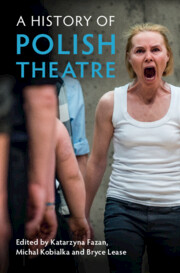Book contents
- A History of Polish Theatre
- A History of Polish Theatre
- Copyright page
- Contents
- Figures
- Notes on Contributors
- Acknowledgements
- A Note on Terminology
- Introduction
- Chapter 1 Where Is Poland? What Is Poland?
- Chapter 2 Staropolski (Old Polish) Theatre
- Chapter 3 The Public Stage and the Enlightenment
- Chapter 4 Romanticism
- Chapter 5 Mapping Theatre (I)
- Chapter 6 Mapping Theatre (II)
- Chapter 7 Modernist Theatre
- Chapter 8 Avant-Gardes
- Chapter 9 Theatre during the Second World War
- Chapter 10 Political Theatres
- Chapter 11 Ritual Theatre
- Chapter 12 Actors and Animants
- Chapter 13 Writing and Dramaturgy
- Chapter 14 Theatre Ontologies
- Index
Chapter 10 - Political Theatres
Published online by Cambridge University Press: 09 December 2021
- A History of Polish Theatre
- A History of Polish Theatre
- Copyright page
- Contents
- Figures
- Notes on Contributors
- Acknowledgements
- A Note on Terminology
- Introduction
- Chapter 1 Where Is Poland? What Is Poland?
- Chapter 2 Staropolski (Old Polish) Theatre
- Chapter 3 The Public Stage and the Enlightenment
- Chapter 4 Romanticism
- Chapter 5 Mapping Theatre (I)
- Chapter 6 Mapping Theatre (II)
- Chapter 7 Modernist Theatre
- Chapter 8 Avant-Gardes
- Chapter 9 Theatre during the Second World War
- Chapter 10 Political Theatres
- Chapter 11 Ritual Theatre
- Chapter 12 Actors and Animants
- Chapter 13 Writing and Dramaturgy
- Chapter 14 Theatre Ontologies
- Index
Summary
Many claim that Polish theatre is political. Joanna Krakowska maps this narrative in Polish historiography, which, as she stresses, is usually construed in cycles determined by political events. Politicality, however, is a capacious and diverse category that offers the possibility of seeing theatre in Poland both as political and as a medium declaring itself to be apolitical, which can become the most meaningful political gesture of all. Krakowska invites us to consider theatre history in relation to the political subject while Grzegorz Niziołek asserts that ‘Polish mainstream theatre is anti-political rather than political’. He demonstrates how political analysis is usurped by an ethical imperative and is thus seen as a threat to the national values – rather than political theatre, theatre was used to strengthen national identity, which obscured wrongdoing. Nevertheless, even theatre that is not explicitly political, Niziołek argues, has produced political effects, and any given historical moment positions theatre in relation to a dominant ideology.
Keywords
- Type
- Chapter
- Information
- A History of Polish Theatre , pp. 260 - 289Publisher: Cambridge University PressPrint publication year: 2022



